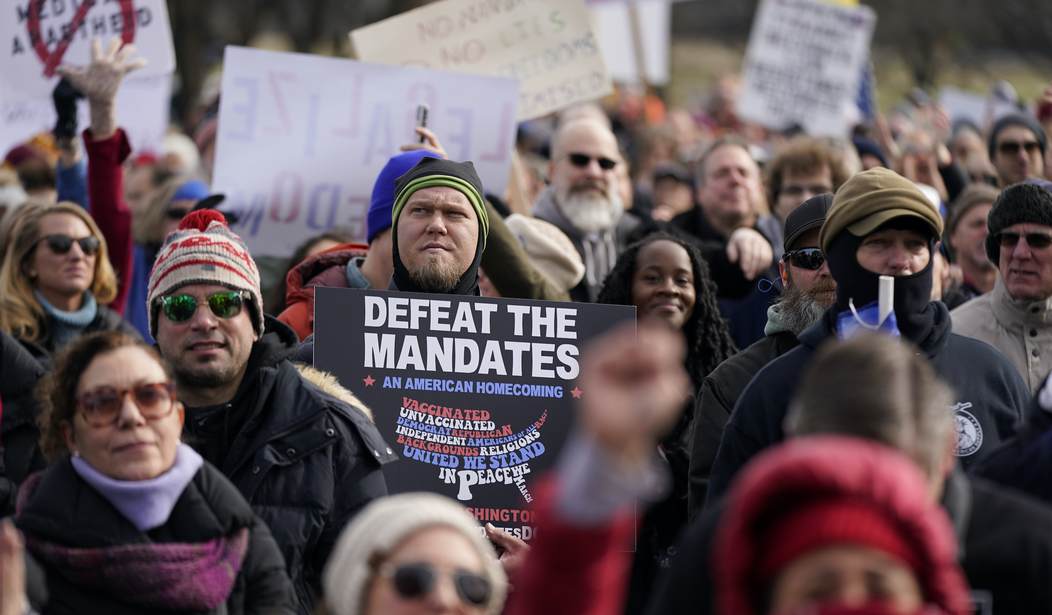On the final day of its term Thursday, the Supreme Court refused to review a New York state law requiring healthcare workers to be vaccinated—without providing the option of a religious exemption. Justices Clarence Thomas, Neil M. Gorsuch, and Samuel A. Alito Jr. dissented from the majority. The Washington Post explains:
In the New York vaccination case, the court had rejected in December an emergency request from doctors, nurses and other medical workers who said they were being forced to choose between their livelihoods and their faith. They said they should receive a religious exemption because the state’s rule allows one for those who decline the vaccine for medical reasons.
The Supreme Court has declined to take up a case involving a COVID-19 vaccine requirement for health care workers in New York that does not offer an exemption for religious reasons. New York is one of three states that do not allow religious exemptions. https://t.co/5GhplwLlPK
— The Associated Press (@AP) June 30, 2022
In August of last year, New York state announced a vaccine mandate for healthcare workers that included exemptions for religious reasons, but just over a week later the state’s Department of Health took away that exemption. New York Attorney General Letitia James said in a brief to the Court:
Like longstanding similar state vaccination requirements for measles and rubella, DOH’s rule at issue here contains a single, limited medical exemption.
But not a religious one.
Back in December, when the Court rejected the emergency request, Justice Gorsuch was critical, writing:
The State’s executive decree clearly interferes with the free exercise of religion—and does so seemingly based on nothing more than fear and anger at those who harbor unpopular religious beliefs. We allow the State to insist on the dismissal of thousands of medical workers—the very same individuals New York has depended on and praised for their service on the pandemic’s front lines over the last 21 months … One can only hope today’s ruling will not be the final chapter in this grim story.
He continued:
These applicants are not ‘anti-vaxxers’ who object to all vaccines. Instead, the applicants explain, they cannot receive a Covid-19 vaccine because their religion teaches them to oppose abortion in any form, and because each of the currently available vaccines has depended upon abortion-derived fetal cell lines in its production or testing.
The state argued that the coronavirus vaccines do not contain aborted fetal cells. However, three EUA (Emergency Use Authorization) vaccines in current use were based on reproductions of fetal cells from abortions done in the 1970s and 1980s. The shots themselves, however, do not actually contain fetal cells.
Judge Thomas noted in dissent:
There remains considerable confusion over whether a mandate, like New York’s, that does not exempt religious conduct can ever be neutral and generally applicable if it exempts secular conduct that similarly frustrates the specific interest that the mandate serves.
He was frustrated that his colleagues refused to review the case, arguing that the Court should provide guidance to lower courts “before the next crisis forces us again to decide complex legal issues in an emergency posture.”
While the Court has delivered opinions that have cheered conservatives recently, most notably the Dobbs abortion case and today’s West Virginia v. Environmental Protection Agency decision, this one is surely going to leave many scratching their heads. It seems counter-intuitive that the Court would refuse to even review a law that forces people to inject themselves with drugs they may object to or do not need. Yes, vaccine mandates are not new—but mRNA vaccines are, and they haven’t been around long enough to know the long-term effects. Also confounding is that vaccine mandates like these are partly to blame for the worker shortages being felt everywhere from the travel industry to summer camps. Most important is that the vaccines don’t stop infection or transmission, which would make a sensible person question the mandate on nonreligious grounds.
The Supreme Court got this one wrong.














Join the conversation as a VIP Member